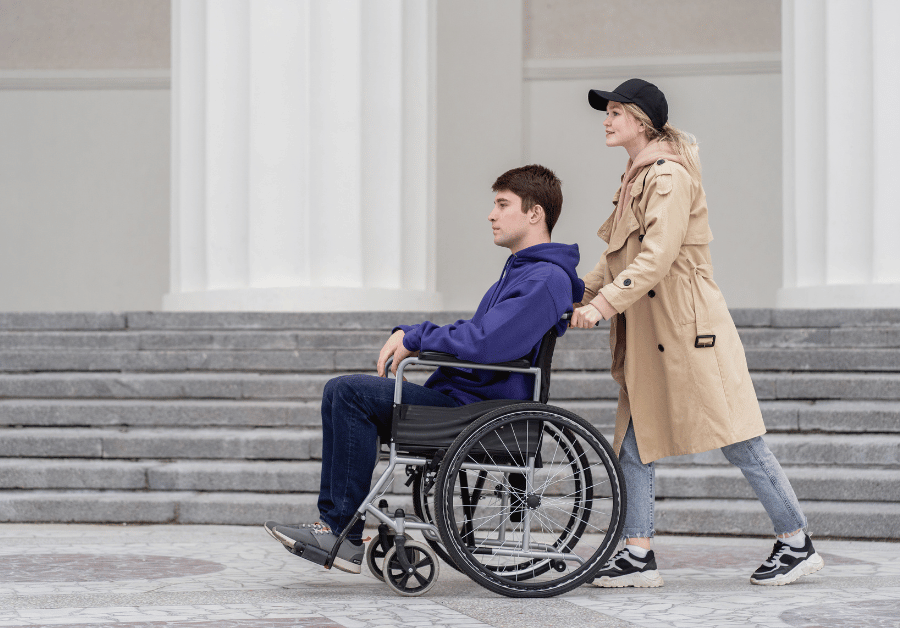Residential Respite Service: Your Guide to Care & Support in Australia
Navigating Residential Respite Service in Australia: A Comprehensive Guide
Caring for a loved one is a profoundly rewarding experience, but it also comes with significant demands. Whether you're supporting an elderly family member requiring aged care, or an individual living with a disability, autism, or ADHD, the dedication involved is immense. This is where a high-quality residential respite service becomes an invaluable lifeline. In Australia, understanding the nuances of residential respite care is key to ensuring both the care recipient and their devoted carer receive the support they need for a break, recovery, or a change of environment. Alliance Care Support is dedicated to empowering individuals with disabilities by providing tailored care, support, and resources, including exceptional residential respite services across Australia.
This comprehensive guide delves into everything you need to know about accessing and benefiting from residential respite in Australia, offering insights that go beyond what you might find on standard government websites. We aim to provide a clearer, more humanised perspective on this vital form of support, ensuring you feel informed and confident in your choices.
What Exactly is Residential Respite Care?

At its core, respite care is about providing a temporary break for carers and a supportive, safe environment for the person being cared for. When we talk about residential respite service, we're referring specifically to short-term care provided in an approved facility, such as an aged care residential home or a dedicated respite house. This differs from in-home respite, where care is provided in the individual's own home.
The primary purpose of residential respite is multifaceted:
- For Carers: It offers an essential break from daily caring responsibilities, allowing them to rest, attend to personal needs, or simply recharge. This can prevent burnout and help maintain the carer's overall wellbeing. Carers Australia believes all carers, regardless of their cultural and linguistic differences, age, or disability, deserve this support.
- For Care Recipients: It provides an opportunity for a change of scenery, social interaction, and access to different activities and professional care. It can also serve as a trial period for permanent residential aged care or a recovery period after a hospital stay.
Residential respite can be categorised into two main types: planned residential respite and emergency residential respite. Planned respite is arranged in advance, allowing families to schedule holidays or personal appointments. Emergency respite, as the name suggests, is for unforeseen circumstances, such as a carer's sudden illness or an urgent need for temporary care. Both forms of subsidised care are crucial components of the Australian care system.
Eligibility and Accessing Residential Respite Services in Australia
Accessing residential respite service in Australia typically depends on the care recipient's needs and age. The two primary pathways are through My Aged Care for older Australians and the National Disability Insurance Scheme (NDIS) for individuals with a disability.
My Aged Care: The Gateway for Aged Care Residential Respite
For older Australians seeking aged care residential respite, the first step is to contact My Aged Care. They will arrange for an assessment by an Aged Care Assessment Team (ACAT). This assessment determines the level of care needed and eligibility for government-funded services, including residential respite care.
Key points regarding My Aged Care:
- Assessment: An ACAT assessment will evaluate the care recipient's physical, medical, psychological, and social needs.
- Entitlement: Eligible clients are entitled to up to 63 days of respite care in a financial year. This can be extended by up to another 21 days if an Aged Care Assessor approves the request.
- Provider Portal (ACPP): For providers, managing residential respite allowances and requesting residential respite extensions for new care recipients assessed on My Aged Care is done through the Aged Care Provider Portal (ACPP). This ensures seamless coordination of care.
NDIS and Respite for People with Disability
For individuals under 65 with a permanent and significant disability, autism, or ADHD, respite care can be funded through the NDIS. Under the NDIS, respite is typically referred to as Short Term Accommodation (STA) or Medium Term Accommodation (MTA). These supports allow a participant to have a short stay away from their usual home, while receiving necessary care and support. Alliance Care Support offers NDIS-approved homes specifically designed for this purpose, providing a safe and engaging environment for participants.
The NDIS funding covers the cost of the care, accommodation, and activities during the residential respite period. It's designed to support both the participant's goals and provide carers with a well-deserved break.
Department of Veterans' Affairs (DVA) Support
Veterans and war widows/widowers may also be eligible for respite care services through the Department of Veterans' Affairs (DVA). DVA's Veterans' Home Care (VHC) program can provide subsidised short-term care, including residential respite, usually in an Australian Government-funded aged care facility. This provides crucial support for those who have served our nation.
Funding and Financial Aspects of Residential Respite in Australia

Understanding the financial side of residential respite service is crucial for families. The Australian Government plays a significant role in subsidising these services, making them more accessible.
Australian Government Subsidies and Supplements
The Australian Government pays a subsidy to approved residential aged care providers for each day a care recipient receives residential respite. This subsidy helps cover the cost of care. In addition to the basic subsidy, various respite subsidies and supplements may be available, depending on the care recipient's needs and the provider's services. These can include supplements for dementia, oxygen, or specific care needs.
It's important to note that while the government provides significant funding, care recipients are generally expected to contribute to the cost of their care if they can afford to. This contribution typically involves:
- Basic Daily Fee: A standard fee set by the government, covering day-to-day living costs like meals, cleaning, and laundry.
- Income-Tested Care Fee: An additional fee for some individuals, based on an assessment of their income. This fee is capped annually and over a lifetime.
- Extra Service Fees: Some providers offer additional services or amenities (e.g., premium rooms, specific activities) for an extra cost.
Always discuss the fee structure transparently with your chosen residential respite provider to avoid any surprises. Alliance Care Support is committed to clear communication regarding all costs associated with our services.
What to Expect from a Quality Residential Respite Facility

Choosing the right residential respite service means looking beyond just the basics. A truly supportive facility will offer a holistic environment that prioritises the wellbeing and engagement of the care recipient. Here's what to look for:
- Tailored Care Plans: A good provider will work with you to develop a personalised care plan that addresses specific needs, preferences, and goals. This includes personal care, medication management, and clinical support.
- Engaging Activities: Beyond basic care, a quality respite cottage or facility will offer a range of recreational activities to keep residents stimulated and socially connected. This might include exercise classes, craft sessions, music therapy, or outings.
- Comfortable and Safe Environment: The facility should be clean, well-maintained, and equipped with accessibility features to ensure safety and comfort. This is particularly important for those with mobility challenges or specific medical needs. Alliance Care Support's NDIS-approved homes are designed with these features in mind.
- Professional and Compassionate Staff: The staff should be highly trained, empathetic, and dedicated to providing person-centred care. Their ability to create a warm and welcoming atmosphere is paramount.
- Nutritious Meals: Access to healthy, varied, and delicious meals, catering to dietary requirements, is a fundamental aspect of quality care.
Whether you're in Sydney, Melbourne, Brisbane, Perth, Adelaide, or Hobart, finding a facility that aligns with these standards is key to a successful residential respite experience. An improving access to aged residential respite care is a focus for many providers, and Alliance Care Support is at the forefront of this.
Alliance Care Support: Your Partner in Residential Respite
Give yourself and your loved one the break you both deserve
Contact Us TodayAt Alliance Care Support, we understand the profound impact a well-structured residential respite service can have on individuals and their families. Our mission is to empower individuals with disabilities by providing tailored care, support, and resources that foster independence and enhance quality of life.
We specialise in creating environments that are not just places to stay, but homes where participants can thrive. Our NDIS-approved homes are equipped with state-of-the-art accessibility features, ensuring safety and comfort for all participants. We offer:
- Supported Independent Living (SIL): Our SIL homes provide an empowering environment for participants to live as independently as possible while receiving the support they need.
- In-Home Care: For those who prefer to remain in their own surroundings, our in-home care services bring professional support directly to your door.
- Specialised Respite Services: Our residential respite options are designed to provide a nurturing and engaging temporary home. Whether it's a short-term stay or a longer break, we ensure a seamless and positive experience. Our approach goes beyond the standard, focusing on individual goals and enriching activities.
We pride ourselves on our compassionate care, enabling our clients to achieve their personal goals and lead fulfilling lives in a supportive community. Our team is committed to making the process of accessing respite care straightforward and stress-free for families across Australia. We believe in improving access to aged residential respite care and disability support, ensuring no one is left without the vital breaks they need.
Eligibility depends on age, needs, and circumstances:
Older Australians (usually 65+, or 50+ for Aboriginal and Torres Strait Islander people) may qualify through My Aged Care after an ACAT assessment.
People under 65 with a permanent and significant disability, autism, or ADHD may be eligible through the NDIS under Short Term Accommodation (STA) or Medium Term Accommodation (MTA).
Veterans and war widows/widowers may qualify through the Department of Veterans' Affairs (DVA) Veterans’ Home Care program.
Planned respite is booked in advance for scheduled breaks, holidays, or recovery periods.
Emergency respite is arranged urgently when unforeseen events occur, such as a carer’s sudden illness, injury, or family crisis.
Both count toward your annual 63-day entitlement and provide the same professional care in an approved facility.
When choosing a provider, consider:
Accreditation – Government-approved for aged care or NDIS-registered.
Tailored care plans – Personalised support for individual needs and goals.
Engaging activities – Social, recreational, and therapeutic options.
Safety and comfort – Clean, accessible, and well-maintained facilities.
Qualified staff – Compassionate, trained professionals experienced in specialised care
The Profound Impact of Residential Respite
The importance of a robust residential respite service cannot be overstated. It's a critical component of the care ecosystem in Australia, providing essential support to both care recipients and their dedicated carers. By offering a safe, stimulating, and caring environment, residential respite ensures that individuals receive the best possible temporary care, whether they are elderly, living with a disability, or managing conditions like autism or ADHD.
For carers, the opportunity to take a break – whether it's a few days or an extended period – is vital for their physical and mental health. This break allows them to return to their caring role refreshed and revitalised, ultimately leading to better long-term outcomes for everyone involved. It's about sustaining the caring relationship and enhancing the quality of life for all members of the family unit.
Alliance Care Support is committed to providing outstanding residential respite services that meet the diverse needs of Australians. We believe in fostering independence, dignity, and wellbeing for every individual we support. Our NDIS-approved homes in major cities like Sydney, Melbourne, Brisbane, Perth, Adelaide, and Hobart are designed to be a true home away from home, ensuring peace of mind for families.
If you or your loved one could benefit from a compassionate and professional residential respite service, we invite you to learn more about how Alliance Care Support can assist you. We are here to help you navigate the options and find the perfect temporary care solution that empowers independence and enhances quality of life.
Ready to explore your residential respite options? Contact Alliance Care Support today to discuss your needs and discover how our tailored services can provide the perfect break for you and your loved one. Empowering independence and enhancing quality of life is our mission.
Learn more about Alliance Care Support's residential respite services today!
